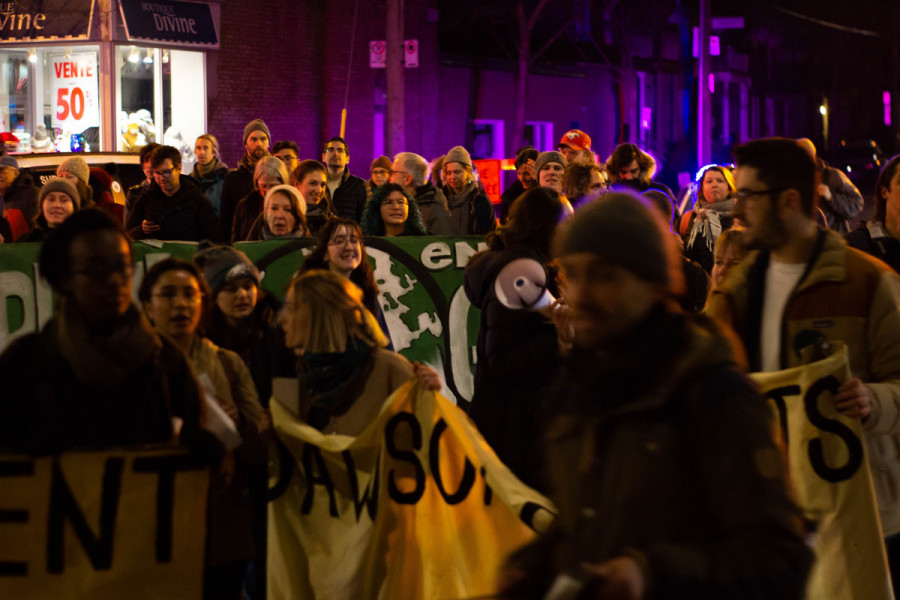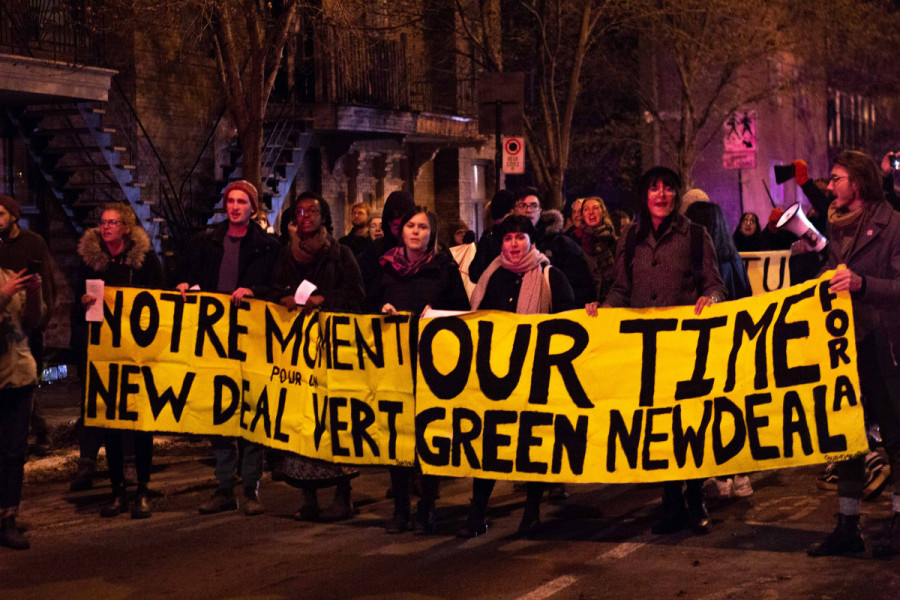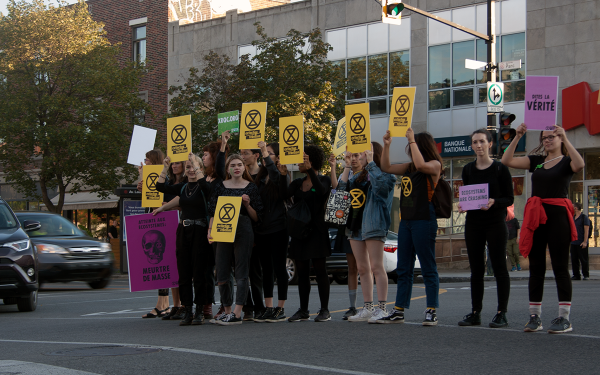Climate Activists Demand Free, Expanded Public Transit System
Protesters Say Averting Climate Disaster Requires Massive Systemic Change
Montreal climate activists assembled Tuesday to demand the abolition of transit fares alongside network expansion as part of an ambitious plan to slash emissions while reducing economic inequality.
“The point is it marries redistribution of wealth with reduction of fossil fuel consumption,” said Dru Jay, a co-founder of Courage Coalition, which led the protest in collaboration with other groups.
About 60 protesters chanted, sang, and briefly blocked traffic during their march from Laurier station to Place des Fleurs-de-Macadam, a public space near Mont-Royal station.
Jay invoked the yellow vest movement and the election of right-wing premiers across Canada to explain why he sees reducing income inequality as key to the success of climate initiatives.
“If you don’t give people an option to say there really is a way to have happier, healthier communities, a solid transportation network, collective solutions, and redistribution of wealth, […] if it’s just between holding up a middle finger and voting for the same old, they’re going to choose the middle finger.”
The idea of free public transit is catching on around the world: Luxembourg, admittedly tiny, is slated to become the first country to implement the policy on a national scale, and a number of cities have already done so on a local basis, including Dunkirk, France and Tallinn, the capital of Estonia.
“I think we’re at the early stages of getting this idea moving,” said Jay, who emphasized that political will is the bottom line in reversing a major share of Canada’s climate footprint.
Around a quarter of Canada’s emissions come from the transportation sector, which is counted separately from oil and gas.
Free transit in Montreal would cost around $620 million per year above the current level of public investment, according to a 2017 report from the Institut de recherche et d’informations socio-économiques.
“Canada spends tens of billions of dollars every year, close to $100 billion on its automobiles,” Jay said, “so I think for a fraction of that we could be creating a comprehensive, highly accessible system of transportation that could meet the needs of 90 per cent of people, and do it at a much lower cost by collectivizing it.”
“It definitely is a massive investment, there’s no question, and that’s what the green new deal is calling for—it’s calling for a massive investment,” said Chloe Rourke of Climate Justice Montreal, a co-organizer. “But we also know the cost of not addressing climate change, or the cost of doing nothing. The status quo option has a cost as well.”
“It’d be super great if the government was encouraging public transit by making it free,” said Maya Day, a member of the Dawson Green Earth Club who attended the protest. “I feel like that would help out a lot.”
Day, 17, has become increasingly involved in climate activism, starting with Les mardis casseroles pour la Planète at Laurier station. She said she and her peers now host an offshoot at Atwater station. She also identified herself as a part of Extinction Rebellion Youth.
“The XR group is mostly young people,” she said. “As much as we want to be intense about it, and we want to be doing as many things as we can to get media coverage, I think it’s really great to be doing these little things once a week.”
She came in a group of ten or more, all from the same environmental club. They were the first to arrive, coming prepared with pots and pans, the noise of which has become a common feature of climate protests.
“When I first started coming here, I kind of felt alone, and I became part of this amazing group and I got to find a whole bunch of cool people, and these people have led me to do a whole bunch of really great things,” she said.
“I feel more in my place when I’m actually fighting for what I believe instead of arguing at home with my parents about the capitalist system and about how it’s not a circular system.” — Maya Day
“I feel more in my place when I’m actually fighting for what I believe instead of arguing at home with my parents about the capitalist system and about how it’s not a circular system,” she said. “It should be circular. So instead I’m out here with these guys because they actually believe in what I believe in.”

Day believes radical action is direly needed, noting that it will soon be too late, but she has been disappointed in the government. “We’ve been faced with pretty much silence. We’ve been faced with buying pipelines,” she said.
Noting that the east of Montreal, where French is more prevalent, is more active, Day suggested the language divide may be more important than the generational one.
“As much as there’s a lot of young groups starting up, there’s a lot of older generations coming out that fight for the same things that we fight for, and it’s absolutely amazing,” she said.
“This is a movement, and it’s warming my heart to see this growing,” said Alain Mignault, 57. He was walking on Mont-Royal Ave. E. when he happened upon the protest, finding he had a more personal connection to it than most.
“I realized they are singing songs, and among their songs, there are two songs for which I wrote the lyrics.”
Mignault was credited for the lyrics to Changeons le système and Pour vaincre les pétrolières in pamphlets distributed to protesters. He cannot take credit, however, for Pipeline Brings, set to the tune of Drake’s Hotline Bling.
“I’m glad those songs are travelling and other people are taking them,” he said. “It’s very impressive to see that the environmental cause is very important for the youth.”
Mignault has hope for the movement itself, if less so for the climate. “We have to keep fighting,” he said.
“I can’t imagine anyone being truly okay with the amount of suffering that would occur if we go beyond two degrees of warming,” said Rourke. “So we only have systematic and radical options left if we want to prevent catastrophic climate change.”
“There’s definitely a case to be made to reshape society to be more equal,” said Jay. “But you can see that as a 100 or 200 year struggle before and now you can’t. Now it’s a 10-year struggle, and it’s a necessity. You can’t achieve what we want without redistributing wealth and power in a fundamental way.”




_600_375_90_s_c1.jpg)

_600_375_90_s_c1.jpg)
